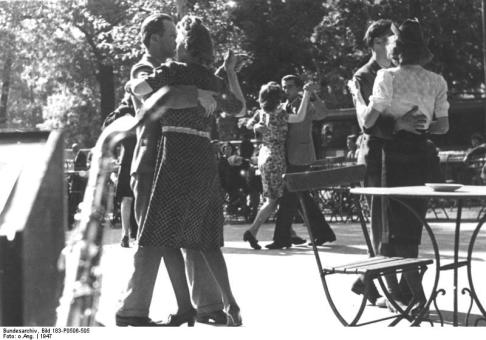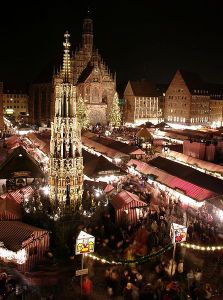I was so sad to hear that Clärchens Ballhaus, my favorite place in all of Berlin, has closed down. Every time I was there, it felt like I stepped back in time to the ballrooms of the 1920s and 1930s. Apparently there’s a new owner and it will be open again after renovations, but *not* renovating was kind of Clärchens’ charm. It looked and felt like the real thing, a nightclub from about 100 years ago. It had the peeling plaster and bullet holes in the mirrors to prove it. It offered tango and cha-cha nights. The waiters wore waistcoats. The last time I was in Berlin, I spent several hours in Clärchens’ various rooms stuffing myself with food and drinks and taking pictures. I’m glad, since Clärchens may never look like this again.
I wasn’t sure what happened to Clärchens after World War II until I got my hands on the official history, Berlin tanzt in Clärchens Ballhaus by Marion Kiesow. From 1942, the Ballhaus closed down under the Nazis (dancing was forbidden), and was used by German army staff officers needing somewhere to pour over their maps. Once Germany surrendered they left a lot of paper behind that Clärchens – open again! – turned to its blank white side and used as “tablecloth.”
Soon the Red Army appeared, using Clärchens courtyard for their horses. But on Saturday, July 14, 1945, the Ballhaus finally opened again for the business of dancing and having fun. The building was in bad shape from the bombardments and fighting, but people climbed through the rubble for a chance to dance and drink a thin kind of punch. The man shortage meant every man could dance the night with constantly changing partners.
Though Clärchens was in the new Soviet Sector of occupied Berlin, people from all over the city could go there in the early years after the war. Those were hard years for most, and some people sought their escape in “Bonbons” – drugs in sweets wrappers that were sometimes openly sold table to table.
By the way, there really was a Clärchen – Clara Bühler, the wife of the original owner of the dance hall at Auguststr. 24. After World War I, she ran the place herself, and for the rest of the century, it was known as Clärchens.
I hope it reopens one day, and with its old charm and authenticity.






